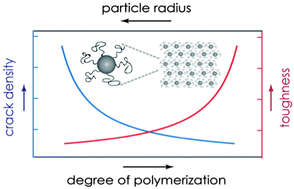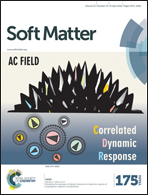Processing fragile matter: effect of polymer graft modification on the mechanical properties and processibility of (nano-) particulate solids
Abstract
The effect of polymer modification on the deformation characteristics and processibility of particle assembly structures is analyzed as a function of particle size and degree of polymerization of surface-tethered chains. A pronounced increase of the fracture toughness (by approximately one order of magnitude) is observed as the degree of polymerization exceeds a threshold value that increases with particle size. The threshold value is interpreted as being related to the transition of tethered chains from stretched-to-relaxed conformation (and the associated entanglement of tethered chains) and agrees with predictions from scaling theory. The increase in toughness is reduced with increasing particle size – this effect is rationalized as a consequence of the decrease of entanglement density with increasing dimension of interstitial (void) space in particle array structures. The increased fracture toughness of particle brush materials (with sufficient degree of polymerization of tethered chains) enables the fabrication of ordered colloidal films and even complex 3D shapes by scalable polymer processing techniques, such as spin coating and micromolding. The results, therefore, suggest new opportunities for the processing of colloidal material systems that could find application in the economical fabrication of functional components or systems compromised of colloidal materials.


 Please wait while we load your content...
Please wait while we load your content...